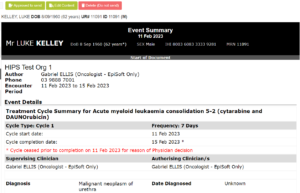Read this article in Pulse+IT.
The Sydney Adventist Hospital (the San) has leveraged EpiSoft’s oncology management system to rapidly implement the NSW Cancer Institute’s eviQ guideline for anticancer drug dosing in kidney dysfunction (ADDIKD). This evidence-based guideline is best practice and aims to improve patient safety by standardising how kidney dysfunction is measured, providing a more appropriate dose recommendation compared to existing calculation methods. Following the initial local publication by eviQ in 2022, the ADDIKD guideline has been recently made available in specific anti-cancer protocols which the San have been swift to adopt using EpiSoft.
Being NSW’s largest private cancer centre, the San faced a significant change management challenge to support the safe transition to the ADDIKD guideline. Besides treating cancer patients, the busy centre offers a range of other day treatments including blood transfusions, immunoglobulin infusions, non-cancer immunomodulating therapies, iron infusions and more. Patient visits have been steadily growing to more than 17,000 annually.
The San has a protocol governance working party with representation from medical, nursing, pharmacy and IT. They meet every quarter to oversee the rigorous process of building and approving protocols for use, decide on changes to improve workflow or mitigate any identified risks, review results from prescribing audits, and ensure that treatment protocols are as up to date as possible. The decision to adopt the ADDIKD guideline meant agreeing on a change management plan to update existing protocols, transition existing patients to use ADDIKD, and communicate changes to relevant stakeholders.
A two-pronged approach was needed because the San books patients for treatment several months in advance. The pharmacists and clinicians jointly re-evaluated the dosing decisions for upcoming patients in light of the ADDIKD recommendation calculated by EpiSoft. A report was extracted to initially compare the difference between eGFR and Cockcroft-Gault calculated doses. In parallel, a rigorous approval process began to permanently upgrade the treatment protocols for new patients in line with San governance procedures.
The EpiSoft oncology management system has significantly reduced the workload of the San’s transition to the ADDIKD guideline because it imports eGFR pathology results used to calculate carboplatin doses in real time. The system enables the clinicians to easily compare calculated doses using the traditional Cockcroft-Gault method to the GFR-based doses on the fly to make clinically appropriate decisions for their patients. The EpiSoft system copies this dosing decision forward to all future cycles of care, subject to periodic review by the patient’s clinical care team.
Traditionally, the governance process of transitioning to new or updated cancer treatment protocols can also be very laborious due to the complex nature of the treatment schedules and medications involved. Fortunately, EpiSoft provides the current eviQ protocols – with the ADDIKD guideline incorporated – pre-built to the San and all cancer sites using the platform. This means that the clinical governance committee just needs to review, customise if required, and approve the protocols with minimal manual data entry, making them available for use by clinicians in a timely manner.
The San is already realising the safety benefits of the ADDIKD guideline that were envisaged by eviQ, as well as significant unexpected efficiency improvements. Prior to the implementation of the guideline, the San’s clinicians were reliant on manual screening to detect patients with kidney dysfunction where the default method (Cockcroft-Gault) was not appropriate. For these patients, the clinicians and pharmacists had to manually calculate and compare dose adjustments. With EpiSoft and the support of the pathology companies standardising the reporting of kidney function in electronic lab results, the San is now able to expedite these prescribing decisions.
“The integration of EpiSoft with eviQ and the ADDIKD guideline has made the transition possible in a short time frame in our busy cancer centre. Implementing best practice is a fundamental pillar of the care we provide to our patients and EpiSoft are a true partner in supporting our vision.” said Lily Chong, project pharmacist and EpiSoft system administrator for Sydney Adventist Hospital.
Looking ahead, EpiSoft is investing significantly in its oncology decision support capabilities and supporting all their sites in their use of the ADDIKD guideline. “We are so pleased to have collaborated with Sydney Adventist Hospital in their roll out of NSW Cancer Institute’s eviQ protocols incorporating the ADDIKD guideline. This change makes it easier and safer for evidence-based treatments to be put into practice.” said EpiSoft CEO, Jenny O’Neill.
“The NSW Cancer Institute’s eviQ guidelines are a tremendous resource for cancer services in Australia and globally. We are proud to support their incorporation in the EpiSoft program to ensure our customers have access to the latest best practice, now including the ADDIKD guideline.”
EpiSoft is Australia’s only all-in-one cloud‐based medical oncology and administration platform for hospitals, home nursing providers and practices providing cancer and other infusion treatments. The platform manages every step of the cancer workflow from the initial specialist consultation through to documentation of diagnosis, protocol ordering, prescription management, pharmacy orders, documentation of nursing assessments and drug administration as well as practice management functions such as inpatient and outpatient billing and claiming. EpiSoft integrates the NSW Cancer Institute’s eviQ protocols so that cancer care providers can easily access and prescribe the latest, evidence-based, peer reviewed and best practice cancer treatments.




